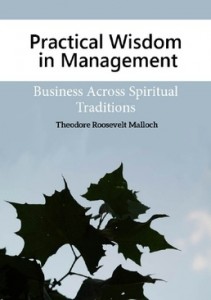Review Author: Melissa Grim
Practical Wisdom in Management, by Theodore Roosevelt Malloch, is the first in-depth and comprehensive case study book to explore how practical wisdom from spiritual and philosophical traditions inspires corporate leadership and permeates many corporate cultures.
Covering ten major worldwide religions, this book provides a comprehensive overview of the practical wisdom of the major faith traditions for management. Practical Wisdom is designed for the classroom and includes in-depth and informative case studies of 28 multinational corporations, analyzed with an emphasis on their values and spiritual inspiration, alongside business and strategic issues.
The book starts with a look at companies and organizations that have incorporated Catholic Social Thought with great success. For instance, Group DANONE is a French food-products multinational that is the leading dairy products company in the world. DANONE focuses not just on profitability but on social justice as well, and hires like-minded individuals. One manifestation of this is the Danone International Prize for Nutrition, which honors individuals or teams that have made advances in the science of human nutrition, one aspect of taking care of the person as a “whole.”
Grameen Bank, a highly successful for-profit bank, is owned almost entirely by its borrowers. Created by Bangladeshi economist Muhammad Yunus, he took seriously the Muslim call for charity for the poor. However, he saw fellow citizens in an endless cycle of debt. After spending decades on the problem, he developed a system that took the belief in charity, and gave the poor not temporary handouts, but a means to get out of debt and start their own businesses. He won the prestigious Peace Prize in 2006.
Yunus’ critique of modern day economics, which led to his innovation, was that: “Many of the problems in the world remain unresolved because we continue to interpret capitalism too narrowly. In this narrow interpretation we create a one-dimensional human being to play the role of entrepreneur. We insulate him from other dimensions of life, such as, religious, emotional, political dimensions.”
Infosys Limited (INFY) is a NASDAQ listed global technology services company, headquartered in Bangalore, India. It has become the second largest IT exporter in India with more than 160,000 employees. Infosys has shown remarkable growth and has received a number of accolades over the last two decades, including best employer. In founding INFY, founder Murphy held above all that he wanted to created an ethical business informed by his Hindu beliefs. Murphy’s guiding ethical and business principle is the Golden Rule, to do unto others, as you would have them do to you.
By the end of 2010, Whole Foods’ growth and leadership position in the natural and organic grocery food market was well established. The company is well known for being a values-based, mission-driven organization that regularly earned distinction among Fortune 500 companies for its employee-friendly culture and policies. It’s founder and CEO, John Mackey, has studied religion and philosophy extensively, and has been greatly informed by Buddhism incorporating the focus on moderation and health as a means to enlightenment. As such Whole Foods has a business model that is aimed at promoting human happiness and well being.
Kraft Foods is a manufacturing giant present in over 150 countries and over 99% of U.S. households. Kraft Foods boasts a unique humanistic version of servant leadership. CEO Irene Rosenfeld identifies servant leadership as central to Kraft’s management framework. Rosenfeld strongly emphasizes the value of servant leadership in corporate management. “The people that work with me understand . . . I am there to help them, not for them to help me.” Kraft has relied on value-based product offerings as a source of growth through marketing and innovation.
Conclusion: This book will be valuable reading for MBA students and students of business ethics and spirituality in business courses, as well as business leaders looking to integrate religious values into their organization. In fact as the book notes, New York-based branding firm BBMG reports that contemporary consumers are increasingly values-conscious; that is, they care about whether the companies they buy from and products they consume reflect or support moral values they espouse. So the reading of this book is timely.

